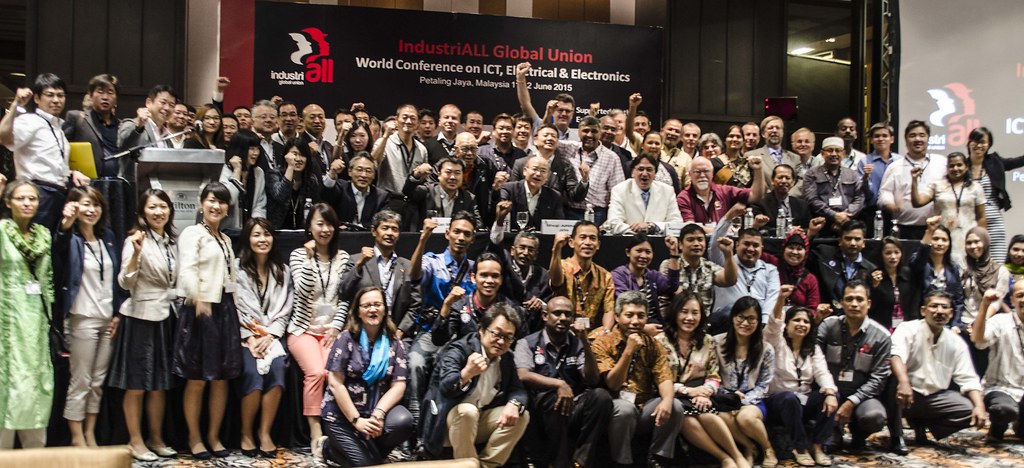3 February, 2015Trade unions met on 11-12 June in Petaling Jaya, Malaysia, for IndustriALL Global Union’s World Conference on ICT, Electrical & Electronics. Around 100 delegates from 32 organizations in 16 countries were present.
In their action plan for the next four years, participants at the World Conference on ICT, Electrical & Electronics affirmed their strong commitment to:
- build union power to confront global capital;
- fight for trade union rights;
- fight against precarious work; and
- promote industrial policy and sustainability.
In the opening speech, Shoji Arino, sector chair, insisted that the situation of precarious workers is getting worse while multinationals are accelerating to expand in this sector.
We must strengthen unity among unions to take wide-ranging solidarity action, especially in the emerging and developing countries,
said Arino.
These are not easy times for workers everywhere, this is why it is our duty as trade unions to organize, educate and empower workers
said Kemal Özkan, IndustriALL AGS, in the opening and welcome of conference.
Kan Matsuzaki, director of ICT, Electrical & Electronics from IndustriALL gave an overview of the global trends and explained
foreign investments in the sector are rushing into ASEAN and India. Countries where the ILO conventions on freedom of association (ILO convention No.87) and the right to collective bargaining (ILO convention No.98) are not respected.
Anne-Marie Chopinet, from IndustriALL affiliate, Force Ouvrière (FO) provided an overview of the situation in Europe. She explained, among other things, that the policies are very strict in Europe, to reduce the debt, but it has an impact on the situation of workers, especially young people under 25 years for whom the unemployment rates reached worrying levels.
In 2014, a five-year project supported by the European Commission was launched in cooperation with the GoodElectronics network. It focuses on organizing electronics workers in the ASEAN region, of which 30 per cent are women, including outsourced workers, temporary workers, migrants and students. In 2014, over 600 trade unionists were trained in organizing from IndustriALL affiliates in Indonesia (FSPMI and Lomenik), Malaysia (EIWU and EIEU coalition), Thailand (TEAM), Vietnam (VUIT) and Taiwan (ROCMU). The project will expand to Philippines from 2015.
Panellists from Thailand, Malaysia and Indonesia expressed how concrete results have already been achieved. Sanya Kromthaisong from TEAM Thailand expressed that his union was going to change their constitution in order to allow migrant workers and agency workers to be organized by TEAM.
Sahul Hamid Bin Hussainm from the EIEU coalition in Malaysia explained that their union has succeeded in organizing workers in the electronics sector, despite strong resistance and union busting tactics by management. And for the first time the union has negotiated a collective bargaining agreement that includes migrant workers.
“In Indonesia, 40 per cent of workers are not registered for social protection. Workers still need to gain knowledge on their trade union rights and workers rights,” said Jusmania from Lomenik. Indonesian unions explained that to try to solve the issue of precarious work, they are taking actions to inform precarious workers about rules and regulations and organize workshops to educate them on their rights.
It was also reported that in Malaysia, unions are losing bargaining power because it is difficult to organize precarious workers when there are more than one labour supplier agency in the company.
A discussion on union expectations of the ILO Global Dialogue forum also took place with the presence of Billy Grayson from the Electronic Industry Citizenship Coalition (EICC). Grayson explained that the EICC noticed that workers most at risk when it comes to temporary labour are young workers, student workers, and migrant workers. “My impression of the ILO Dialogue Forum was positive, I felt good about the consensus points that came out of the forum. The process is very slow but important to engage in. we need to stay engaged in the ILO discussion.” he said. For more on the EICC, see the full interview with Billy Grayson here.
“Workers must organize contract workers and other unorganized workers” said Reden Alcantara, MWAP Philippines, “for the ILO Global Dialogue forum, the challenge lies in how it will be implemented. Unions maintain that fluctuating demand is not an excuse to employ precarious workers!” he concluded.
Unions shared their activities on sustainable industrial policy and the issues and challenges that they face to encourage it. Participants discussed how to overcome the challenges in the global supply chains in the Electronics industry.
This sector is dominated by big multinational companies this is why it is important for IndustrALL to build union power at the global level to confront multinational companies.
Karl-Heinz Hageni, IG Metall, Germany explained that “More digital platforms are emerging for jobs which has a great impact on working conditions and employment, this is why IG metal has launched www.Faircrowdwork.org to protect these workers”.
The conference adopted the sector’s Action Plan, based on IndustriALL’s goals and key strategies.
Participants also approved a resolution on unfairly dismissed workers at PT. Philips Industries Batam. The Conference called on the company to stop harassing the workers and resume the collective bargaining negotiations with FSPMI to achieve a fair and just resolution of this conflict as well as create a constructive relationship between labour and management.
Shoji Arino, JEIU Japan and Prihanani Boenadi were elected as Co-chairs of the ICT, Electrical & Electronics sector.
The conference was followed by a plant visit at the Panasonic PAPAMY plant in Malaysia, when air conditioning units are produced. The delegation met with the local union leaders and the Panasonic management. The visit allowed delegates to understand the history and constructive relationship between the union and the management.










